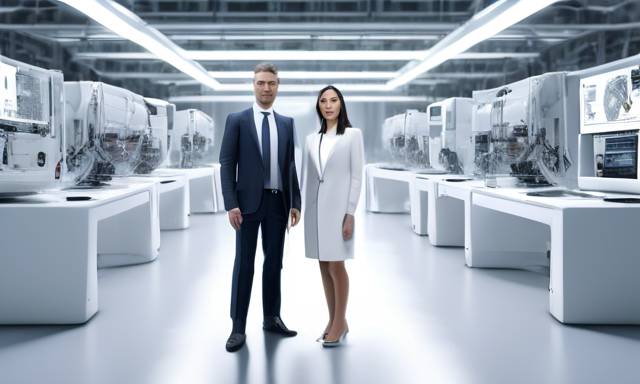Lawrence Jengar
Oct 18, 2024 02:33
Siemens and NVIDIA enhance eco-friendly manufacturing by utilizing digital twins, a method that minimizes emissions and optimizes production processes through real-time data and advanced simulations.
Innovations in Sustainable Manufacturing 🌱
In a notable advancement towards eco-friendly production, Siemens and NVIDIA are spearheading the application of digital twins to refine manufacturing workflows and lower carbon footprints. This ground-breaking initiative aligns with a larger mission to enhance sustainability throughout various stages of manufacturing, from sourcing materials to managing end-of-life processes.
Tackling Obstacles in Eco-Friendly Production ⚔️
Striking a balance between eco-friendliness and financial viability presents challenges for manufacturers. A report from Ernst & Young in 2022 pointed out that digital twin technology could decrease construction costs by as much as 35%, underscoring the strong connection between resource consumption and expenditure. Nevertheless, issues related to departmental silos and data management continue to act as substantial barriers.
Numerous manufacturers encounter difficulties in effectively utilizing abundant data, which can hamper sustainability objectives. Findings from The Manufacturer indicated that inefficiencies in data handling adversely affect both energy efficiency and sustainability, as data is often restricted to localized applications.
Digital Twins: Transforming the Manufacturing Paradigm 🔄
Digital twins, driven by platforms such as NVIDIA Omniverse, are revolutionizing the manufacturing environment. By organizing and contextualizing engineering information, digital twins offer a holistic perspective that bolsters collaboration across different departments. This technology facilitates the simulation and fine-tuning of designs and processes, thereby reducing waste and errors in production.
Siemens is seamlessly incorporating NVIDIA Omniverse APIs into its Xcelerator platform, allowing organizations to formulate intricate digital twins that improve resource management. Enterprises like HD Hyundai are capitalizing on these tools to visualize complex engineering data, thereby advancing their sustainable manufacturing initiatives.
Moreover, Foxconn has created a virtual factory through digital twin technology to enhance its production cycles. By replicating factory conditions in a simulated environment, Foxconn aims for heightened automation and efficiency, targeting a yearly energy consumption reduction of 30%.
Maximizing Energy Efficiency ⚡
The escalating demand for artificial intelligence poses a dilemma for industries needing to reconcile energy efficiency with AI advancements. Accelerated computing platforms, which combine both GPUs and CPUs, provide a viable solution by improving computational effectiveness while lowering energy consumption. These advanced systems have shown to be up to 20 times more energy efficient in AI operations compared to conventional CPU systems.
Producers can further lessen their environmental impact through strategic energy management, which includes sourcing renewable energy and implementing innovative approaches such as heat recovery practices.
The Evolution of Eco-Friendly Production: Digitalization in Industry 🌐
The forthcoming phase of manufacturing is set to integrate the industrial metaverse, where the distinction between digital and physical environments blurs. This transformation will pave the way for more interactive digital twins, enabling quicker, data-centric decision-making processes. Siemens’ CEO, Roland Busch, underscores the transformative potential of these developments in reshaping product design and manufacturing techniques.
Pioneering Change with Digital Twins and Eco-Conscious Computing ☁️
The partnership between Siemens and NVIDIA illustrates the capabilities of digital twins and accelerated computing in diminishing the ecological footprint of manufacturing. By employing advanced simulations and insights derived from AI, manufacturers can achieve significant improvements in energy efficiency and waste reduction on their journey toward decarbonization.
Hot Take 🚀
The collaboration between Siemens and NVIDIA is a powerful example of how technology can lead to significant advancements in sustainable manufacturing. As digital twins become increasingly integrated into manufacturing processes, the industry is poised to move towards a more environmentally friendly future. The integration of data-driven solutions and simulation technologies not only enhances operational efficiency but also contributes to the global commitment to sustainability.





 By
By
 By
By
 By
By
 By
By
 By
By